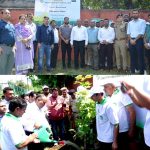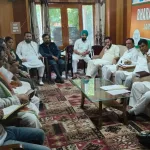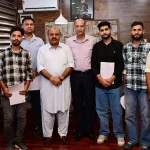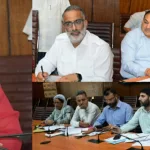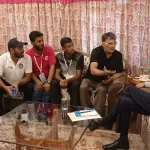Srinagar, Sept 09: As the long-anticipated Jammu and Kashmir Assembly elections draw closer, young voters in the Rafiabad constituency are voicing their hopes and demands for transformative change. The focus is on overhauling critical sectors such as healthcare, tourism, infrastructure, and, most urgently, addressing the pressing employment crisis.
For the first time in a decade, voters in Jammu and Kashmir are preparing to cast their ballots following the Election Commission’s announcement. The electorate in Rafiabad, one of the 90 constituencies, is reflecting on the many years of neglect and is eager to elect a candidate capable of resolving these enduring issues.
Nasir Ahmad, a youth voter, emphasized the acute employment crisis plaguing the region. “Educated and unemployed youth are struggling to find jobs,” he remarked. “Every month, employees in various departments retire, yet there are few opportunities for new graduates. This has left many young people stressed and discouraged.”
In addition to employment, healthcare infrastructure is a major concern. The trauma center at Watergam, established some years ago, remains underutilized due to government neglect. “This center, situated on the highway between Kupwara and Baramulla, was meant to address road traffic injuries but remains a facility in name only,” Nasir explained. “Lack of manpower and the absence of necessary posts have rendered it ineffective, forcing trauma patients to travel to Baramulla or Srinagar, often losing critical time.”
The primary healthcare centers (PHCs) in the area are also underperforming, with residents complaining about the lack of basic facilities. “The PHCs at Dangiwacha and Ruhamna are supposed to provide essential services like X-ray, ECG, and ultrasound, but they are severely under-equipped,” Nasir added.
Infrastructure, particularly road connectivity, is another area where Rafiabad’s residents feel left behind. Mushtaq Ahmad, a local resident, pointed out that while urban roads have seen some improvement, rural and peripheral areas like Panzula remain neglected. “During winter months, the situation is particularly dire, with roads cut off and people facing immense difficulties,” he said.
Agriculture, a key economic sector in the region, is also facing challenges. Farmers in Rafiabad are seeking a waiver on the interest of their Kisan Credit Card (KCC) loans, citing financial difficulties. They argue that schemes meant to aid agriculture and horticulture rarely reach those in need due to a lack of awareness programs.
Tourism, another potential growth area for Rafiabad, remains underdeveloped despite the region’s natural beauty. Local attractions like Mund Daji, a picturesque village surrounded by lush green meadows, are yet to be fully harnessed. Though the district administration organized a snow festival last year to promote tourism, residents feel more consistent efforts are needed.
Traffic congestion due to encroachments along the Baramulla-Kupwara road is another pressing issue, with locals calling for road widening and better maintenance. “Improved road infrastructure would not only ease daily commutes but also boost economic activities,” Mushtaq emphasized.
As Rafiabad gears up for the upcoming elections, the demands of its voters are clear. They seek a leader who can address these longstanding issues and lead the constituency towards a brighter future.
The Jammu and Kashmir Assembly elections will be held in three phases—on September 18, September 25, and October 1—with results expected on October 8, 2024. This election marks the first since Jammu and Kashmir’s special status was revoked and statehood withdrawn in 2019.
Rafiabad youth demand reform: Voters’ call for overhaul of employment, healthcare & infrastructure

Leave a Comment Leave a Comment


